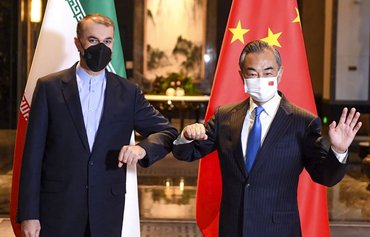Iranians who spoke with Al-Mashareq have expressed concern that government-issued smart national identity cards, now mandatory for all Iranian citizens, are being used as a form of state surveillance, to monitor their activity.
They also pointed to challenges some Iranians have faced in obtaining the smartcards, which are now required in order to access some of the state services and benefits to which they are entitled.
The government began issuing national identity cards in 2012, over a decade after it issued each citizen with a national identity number. Prior to this, birth certificate numbers were used to verify identity.
In 2017, the government of President Hassan Rouhani announced that every individual over the age of 15 must obtain a smart national identity card, and that regular national identity cards would no longer be acceptable.
People must pay to obtain these cards, and go through a registration process that requires them to provide all their identifying documents, including their birth certificate, as well as their past and present physical addresses.
According to reports in Iranian media, the issuance of smartcards is a profitable venture for the government, as only a small percentage of the payments collected goes towards the cost of issuing the cards.
Many still without smartcards
Iranians without the new smartcards are effectively not Iranian, in the sense that they cannot claim state benefits, Iranian daily Donya-ye Eqtesad wrote in 2018.
Iranians living outside the country cannot obtain a smartcard, as they are only issued in Iran and will only be given to the individual, not an attorney or family member. Officials have said the service may be offered overseas "in the future".
The smartcards contain the cardholder's biometrics, photograph and electronic signature. Every citizen must present their card to access bank services or for any service or task at a government agency.
Although the government has deemed the new smartcards mandatory, some members of the public, mostly those living in rural areas, still do not have one.
National Registration Organisation spokesman Seyfollah Aboutorabi said that out of the 62 million people who are eligible to receive the cards, 55 million people have registered to obtain them.
Of this number, roughly 45.5 million have received them so far, which means 10 million people who have registered and paid to get a smartcard are still waiting.
Vital medications tied to cards
Insulin, chemotherapy drugs and many other medications are scarce in Iran.
Since early October, insulin has only been available at a very high price on the black market -- a situation Iranian media have described as an insulin crisis.
Iran's Food and Drug Administration spokesman Kianoush Jahanpour has said insulin will be sold only if the patient's smartcard is presented, along with the required medical documents.
Even flu vaccines, which, despite the government's promise, were not distributed in late September, were promised to be only administered to citizens holding a smartcard.
As of late October, there is no sign of insulin or flu vaccines in Iranian pharmacies or medical centres.
Monitoring people's movements
"The government has created and is constantly expanding a database that monitors social, political and economic activities, affiliations and assets of Iranian citizens," said former government registrar Hassan-Ali Dadsetan.
Using national smartcards, the Iranian regime can monitor every move and access information about any individual, even their medical records, he told Al-Mashareq.
Domestic and international travel is monitored by way of these cards, he said. Those who wish to purchase foreign currency on the days currency is scarce in the market also must present a smart national card.
The same is true for paying fees and taxes to leave the country. There is also a statement on the card that mandates the cardholder to report address changes to the National Organisation for Civil Registration.
The process of issuing smart national cards was halted about 18 months ago.
Aboutorabi said the government has faced problems in obtaining the materials used for issuing and printing the cards since February 2018.
Until that time, materials had been purchased from China.
While the government has not indicated why the cards are no longer being imported from China, it is making efforts to produce the cards domestically.
Aboutorabi said 324,983 cards have been produced between March and September of this year. He said Iran-made cards are similar to the Chinese ones and "all technical matters have been adhered to during their production".
Compromising Iranians' privacy
An employee at the National Organisation for Civil Registration, who is familiar with the process of issuing smart national cards, spoke with Al-Mashareq on the condition of anonymity.
He said in 2010, an Iranian delegation traveled to the Chinese Technology Hub in Shenzhen to discuss a plan to issue smart national cards, and contracted the Chinese company ZTE to set up a national smart card system in Iran.
The Chinese involvement will likely create problems for Iranians, he said, "since we know that the Chinese government controls all actions of its citizens". In essence, he added, "the privacy of Iranian citizens is severely compromised".
Dadsetan told Al-Mashareq the production of Iranian smartcards in China means the Chinese government can access Iranians' information.
In addition to increasing Iran's dependence on China, this also would pose a risk to the Iranian regime, he said, noting that the Chinese could exercise pressure as they are likely to be aware of the actions of members of the Iranian public.

![Government-issued smart national identity cards are now mandatory for all Iranian citizens. [Photo via IRNA]](/cnmi_am/images/2020/10/28/26565-Iran-smart-card-600_384.jpg)







kawser
Reply2 Comment(s)
An interesting point. After my mother passed away due to the coronavirus the hospital did not released the deceased body for funeral, because of the tens of millions [owed in medical bills]. I handed them my national ID card, along with a check as collateral, and the hospital still has them. Moreover, the hospital does not accept the payments in the form of installments. And … Now, the hospital is probably buying and selling medicine with [the National ID card]. They took a check. But that's why the hospital wanted to have my National ID card.
Reply2 Comment(s)